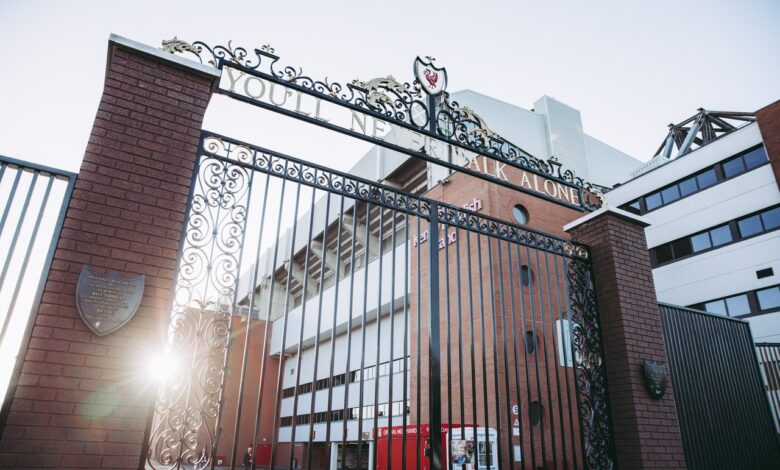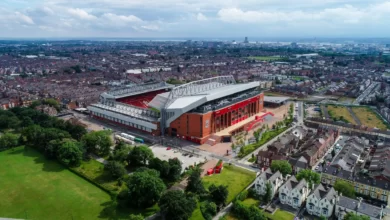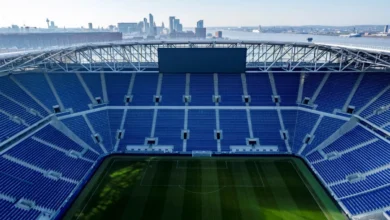
Liverpool Football Club: A Chronicle of Glory and Legacy
Founded in 1892, Liverpool Football Club stands as one of the most illustrious names in the history of football. With a rich heritage, a fervent fanbase, and a legacy of triumphs, Liverpool has left an indelible mark on the global footballing landscape.
| Year | Milestone/ Achievement |
| 1892 | Liverpool Football Club founded |
| 1901 | Promotion to the First Division |
| 1906 | First top-flight championship |
| 1973 | UEFA Cup (First European Trophy) |
| 1977 | First European Cup (Champions League) |
| 1978 | Second consecutive European Cup |
| 1981 | Third European Cup, clinched at Parc des Princes |
| 1984 | Fourth European Cup, defeating AS Roma at Stadio Olimpico |
| 1989 | Hillsborough Disaster |
| 1992 | FA Cup win dedicated to Hillsborough victims |
| 2001 | Treble: League Cup, FA Cup, UEFA Cup |
| 2005 | Fifth European Cup, Miracle of Istanbul |
| 2010 | NESV takeover (Now Fenway Sports Group) |
| 2019 | Sixth European Cup, defeating Tottenham Hotspur |
| 2020 | Premier League Champions after 30 years |
The Early Years (1892-1959)
Liverpool Football Club was born out of the ashes of Everton Football Club, when a dispute over rent led to a split among the club’s directors. Anfield, Everton’s original home ground, became the cornerstone for the newly formed Liverpool FC.
Liverpool Football Club emerged from the embers of a dispute between Everton’s directors over rent at Anfield, Everton’s original home ground. This led to the formation of Liverpool FC in 1892. The fledgling club initially competed in the Lancashire League and later the Second Division, gradually building their reputation and fanbase.
In 1901, Liverpool made a historic leap into the First Division, signaling their arrival among the elite of English football. The club’s first top-flight championship came in 1906 under the stewardship of manager Tom Watson, who played a pivotal role in shaping Liverpool’s early identity.
The interwar years were marked by challenges and triumphs. Liverpool clinched their fifth top-flight title in the 1921-1922 season, showcasing their resilience during an era marked by societal and economic turmoil.
However, the club faced a period of hardship in the 1930s, culminating in relegation to the Second Division in 1954. This setback, though significant, proved to be a temporary setback, as Liverpool quickly bounced back, achieving promotion back to the top flight in 1962 under the management of Bill Shankly, heralding a new era of success.
During this formative period, Liverpool was also becoming known for its distinct identity. The iconic red kit and the Anfield atmosphere were becoming synonymous with the club, creating a sense of unity and belonging among fans that endures to this day.
Shankly’s Revolution (1959-1974)
Bill Shankly, one of the most revered figures in Liverpool’s history, took the reins in 1959. His arrival marked a turning point in the club’s fortunes. Shankly’s visionary leadership, tactical acumen, and charismatic personality transformed Liverpool into a force to be reckoned with.
Under Shankly’s guidance, Liverpool clinched three First Division titles and their first-ever FA Cup in 1965. Shankly’s emphasis on teamwork, discipline, and a never-say-die attitude permeated through the squad and laid the foundation for the glories that would follow.
Shankly’s influence extended beyond the pitch, as he fostered a sense of community and camaraderie that endeared him to fans and players alike. His famous quote, “It’s not just a football club, it’s a way of life,” encapsulates the deep-seated connection between Liverpool Football Club and the city it calls home.
The early years of Liverpool Football Club were marked by a steady ascent from humble beginnings to the upper echelons of English football. Through the dedication of players, visionary leadership of managers like Tom Watson and Bill Shankly, and the unwavering support of fans, Liverpool’s legacy was being forged.
As the 1960s unfolded, the foundations were laid for an era of unparalleled success, one that would see Liverpool become a dominant force both in England and on the European stage. The indomitable spirit and traditions established during these early years continue to be integral to the club’s identity, shaping its path to glory in the years that followed.
The Golden Era (1970s-1980s)
The 1970s and 1980s marked a period of unparalleled success for Liverpool FC. Under Bob Paisley, and later Joe Fagan and Kenny Dalglish, the club clinched numerous league titles, FA Cups, League Cups, and European titles. Liverpool’s dominance extended to Europe, where they won four European Cups between 1977 and 1984, a record at the time.
The backbone of this success was a spine of iconic players like Kenny Dalglish, Graeme Souness, Alan Hansen, and Ian Rush. Their exceptional talent and teamwork propelled Liverpool to the summit of English and European football.
The 1970s and 1980s were a golden age for Liverpool Football Club, characterized by an unprecedented level of success and a cast of iconic players and managers. Here’s a list of some of the key highlights and figures that defined this remarkable era:
- Bob Paisley: Bob Paisley succeeded Bill Shankly as Liverpool’s manager and guided the club to an extraordinary period of dominance. Under his stewardship, Liverpool won six First Division titles, three League Cups, three European Cups, and the UEFA Super Cup.
- European Cup Triumphs: Liverpool clinched four European Cup titles during this era, asserting their supremacy on the continental stage. The victories came in 1977, 1978, 1981, and 1984, making Liverpool the most successful English club in European competition at the time.
- Kenny Dalglish: Kenny Dalglish, one of Liverpool’s greatest-ever players, became a talismanic figure during this era. His skill, creativity, and leadership on the field were instrumental in the club’s success. Dalglish’s ability to score crucial goals and create opportunities made him a fan favorite.
- Graeme Souness and Alan Hansen: Souness and Hansen were key pillars of Liverpool’s defense and midfield. Their composure, intelligence, and ability to read the game played an essential role in Liverpool’s success during this period.
- Ian Rush: Ian Rush was the prolific goal-scorer who became Liverpool’s all-time leading scorer during this era. His clinical finishing and ability to score in crucial moments were instrumental in the club’s success.
- League Dominance: Liverpool won the First Division title a total of eleven times during the 1970s and 1980s, including a remarkable three consecutive titles between 1981 and 1984.
- FA Cups and League Cups: In addition to their league and European successes, Liverpool also clinched several FA Cups and League Cups during this period, showcasing their domestic dominance.
- Boot Room Legacy: The “Boot Room” at Liverpool became legendary, serving as the tactical think tank where the club’s managers and coaches devised winning strategies and nurtured a distinctive style of play.
- Anfield Atmosphere: Anfield’s famous atmosphere, with the “You’ll Never Walk Alone” anthem echoing through the stands, played a crucial role in intimidating opponents and inspiring the team.
- Consistency and Teamwork: Liverpool’s success during this era was built on a culture of consistency and teamwork. The players’ understanding of each other’s strengths and a commitment to the club’s values were central to their achievements.
The 1970s and 1980s represented a glorious chapter in Liverpool’s history, where the club not only dominated English football but also made a lasting impact on the European stage. The legacy of this era continues to inspire future generations of Liverpool players and fans as they chase further glory and success.
Tragedy and Triumph (1989-2000)
The Hillsborough disaster in 1989, where 96 Liverpool fans lost their lives, stands as one of the darkest days in the club’s history. The tragedy profoundly affected the club and its supporters, and its impact continues to resonate to this day.
Despite the immense grief, Liverpool rallied and clinched an emotional FA Cup victory in 1992. This triumph, dedicated to the memory of the Hillsborough victims, was a testament to the club’s resilience and the unwavering spirit of its fans.
The Premier League Era (1992-Present)
The establishment of the Premier League in 1992 brought a new era of competition to English football. Liverpool maintained their status as a force to be reckoned with, clinching numerous domestic and international honours.
The advent of the Premier League in 1992 ushered in a new era of English football, and Liverpool Football Club continued to be a prominent force. Here are some of the key moments and figures that have defined Liverpool’s journey in the Premier League era:
- Inaugural Premier League Season (1992-1993): Liverpool finished sixth in the inaugural Premier League season under the management of Graeme Souness.
- Roy Evans’ Entertaining Football (1994-1998): Under the management of Roy Evans, Liverpool played an exciting, attacking style of football that earned them the nickname “The Spice Boys.” Despite entertaining performances, they narrowly missed out on the Premier League title.
- Rafael Benítez and the Miracle of Istanbul (2005): In one of the most memorable moments in football history, Liverpool, under Rafael Benítez, staged a stunning comeback from 3-0 down at half-time to win the Champions League final against AC Milan in Istanbul.
- Premier League Runners-Up (2008-2009): Liverpool came tantalizingly close to winning the Premier League title in the 2008-2009 season under the management of Rafa Benítez but finished as runners-up to Manchester United.
- Brendan Rodgers and the 2013-2014 Season: Under Brendan Rodgers’ dynamic management, Liverpool mounted a strong challenge for the Premier League title in the 2013-2014 season. The team played exhilarating football with Luis Suárez and Daniel Sturridge leading the attack, but ultimately finished as runners-up.
- Jurgen Klopp’s Arrival (2015): The appointment of Jurgen Klopp as manager brought renewed optimism to Liverpool. His charismatic leadership and high-pressing style of play, known as “Gegenpressing,” revitalized the team.
- The 2018-2019 Season: Liverpool mounted a thrilling challenge for the Premier League title, finishing just one point behind eventual champions Manchester City. They also clinched their sixth Champions League title, defeating Tottenham Hotspur in the final.
- The Premier League Triumph (2019-2020): Liverpool secured their first top-flight league title in 30 years in the 2019-2020 season, clinching the Premier League title with a record seven games to spare.
- Record-Breaking Points Tally (2019-2020): Liverpool’s title-winning campaign in the 2019-2020 season saw them amass a remarkable 99 points, the second-highest total in Premier League history at the time.
- Challenging for More Titles (2020-Present): Liverpool continues to be a formidable force in English and European football, consistently competing for top honors in various competitions.
The Premier League era has seen Liverpool experience highs and lows, but the club’s legacy of success, coupled with passionate fan support and iconic moments, continues to cement its place among the elite in world football. Under Jurgen Klopp’s stewardship, Liverpool has reestablished itself as a dominant force, and the future looks promising for the club.
Recent Achievements (2010-Present)
In recent years, Liverpool has enjoyed a renaissance under the guidance of Jurgen Klopp. The German manager, known for his charismatic style and tactical brilliance, led the team to unprecedented success. The 2018-2019 season saw Liverpool clinch their sixth European Cup, reaffirming their status as a continental powerhouse.
The pinnacle of Liverpool’s resurgence came in the 2019-2020 Premier League season, as they secured their first top-flight title in 30 years. Klopp’s “mentality monsters” displayed a brand of football that was both electrifying and effective, captivating fans worldwide.
The Anfield Experience
Anfield, Liverpool’s historic home ground, is more than just a stadium; it’s a cauldron of passion and an emblem of the club’s indomitable spirit. The atmosphere generated by the Anfield faithful has been the driving force behind many memorable Liverpool victories.
Conclusion
Liverpool Football Club’s history is a tapestry woven with triumphs, tragedies, and an unyielding spirit that defines the club and its supporters. From the Shankly era to Klopp’s “Heavy Metal Football”, the club’s legacy endures through generations of players and fans.
As Liverpool continues to chase glory on both domestic and European fronts, the club’s storied history serves as a foundation upon which future triumphs will be built. With its rich heritage and a global fanbase that spans continents, Liverpool FC remains an iconic institution in the world of football.







